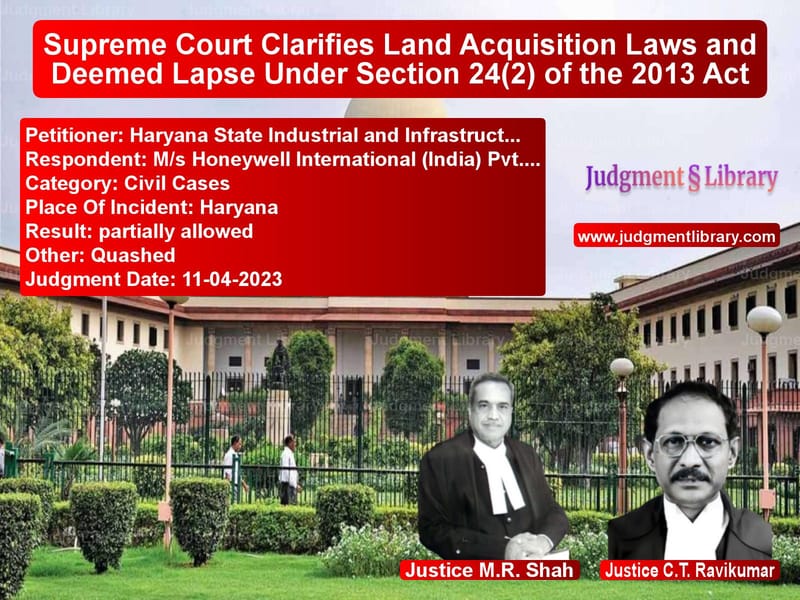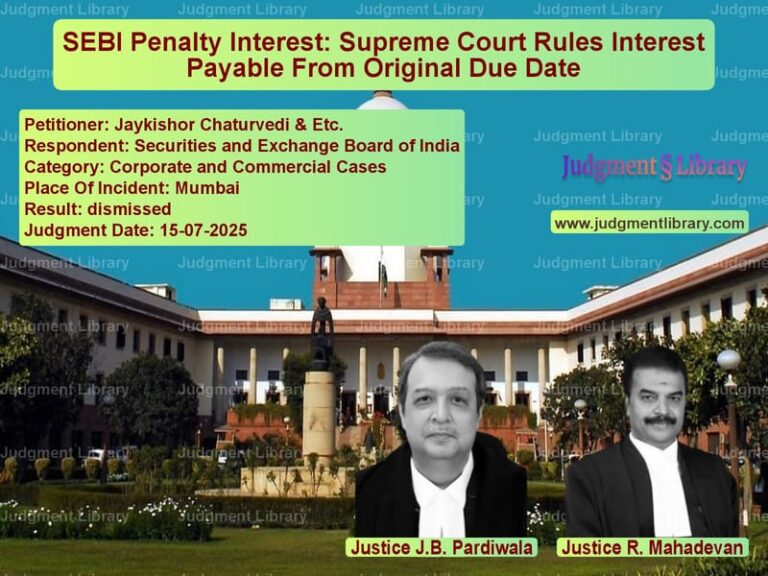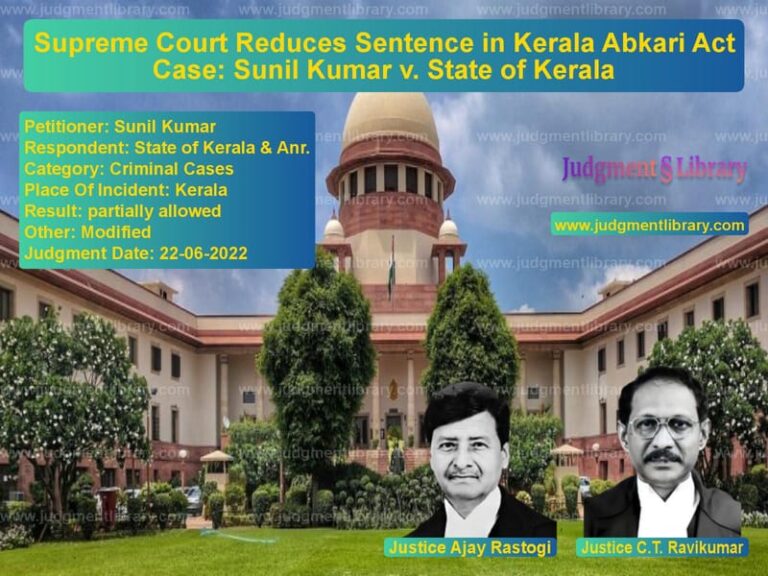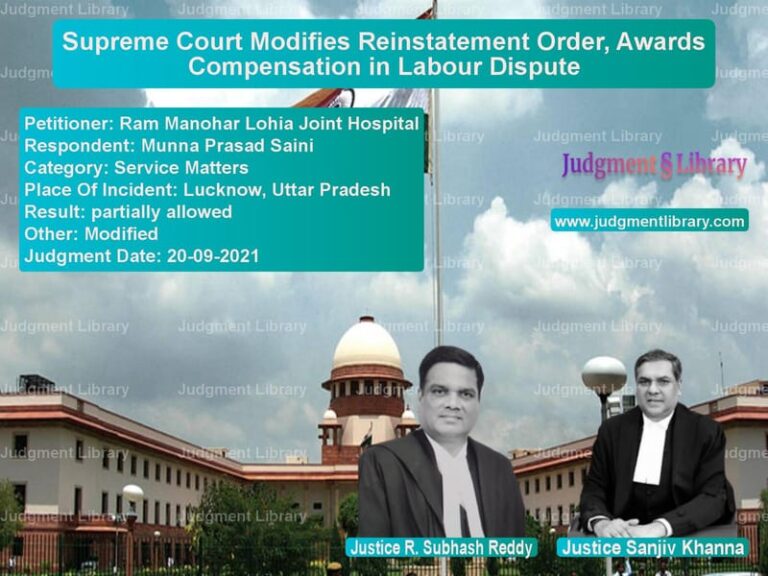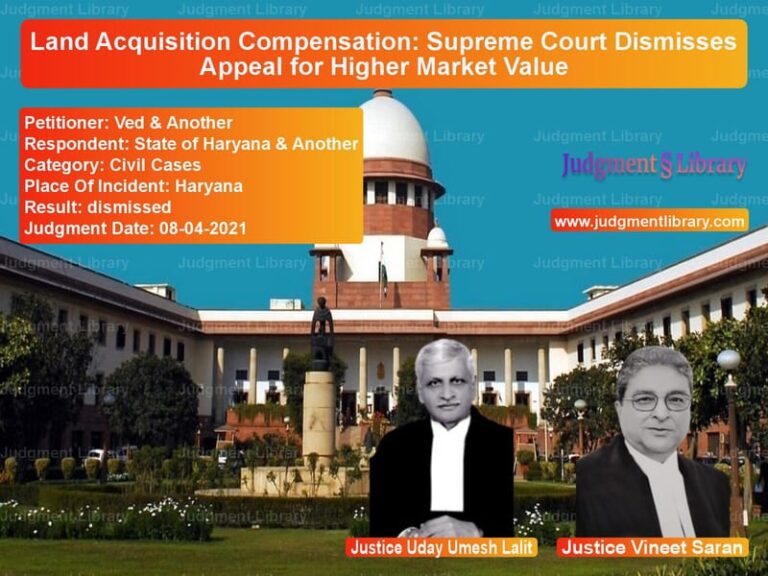Supreme Court Clarifies Land Acquisition Laws and Deemed Lapse Under Section 24(2) of the 2013 Act
The Supreme Court of India, in a crucial decision regarding land acquisition laws, addressed the issue of land acquisition under the Land Acquisition Act, 1894 in relation to the Right to Fair Compensation and Transparency in Land Acquisition, Rehabilitation, and Resettlement Act, 2013 (Act 2013). The case, Haryana State Industrial and Infrastructure Development Corporation Ltd. (HSIIDC) & Ors. vs. M/s Honeywell International (India) Pvt. Ltd., involves the interpretation of Section 24(2) of the 2013 Act and its applicability to various land acquisition proceedings.
The case was a direct result of multiple writ petitions challenging land acquisitions carried out prior to the enactment of the 2013 Act. The petitioners sought to have their land acquisitions declared as “deemed to have lapsed” due to the non-payment of compensation or lack of physical possession of the land. The key issue raised was whether the acquisition proceedings could be deemed lapsed under Section 24(2) of the 2013 Act, which governs the lapsing of land acquisitions if compensation was not paid and possession was not taken.
Background of the Case
The case emerged from a dispute regarding the acquisition of land for industrial purposes in Haryana. The Haryana State Industrial and Infrastructure Development Corporation (HSIIDC) had initiated land acquisition proceedings under the Land Acquisition Act, 1894, for the development of industrial infrastructure. However, certain landowners challenged the acquisition, claiming that neither the compensation had been paid nor had the possession of the land been taken.
The original petitioners, who were landowners, filed writ petitions in the Punjab and Haryana High Court, arguing that the acquisition proceedings had lapsed under Section 24(2) of the 2013 Act. They contended that the acquisition had not been completed according to the requirements outlined in the new law, and thus the acquisition should be deemed void.
The High Court ruled in favor of the petitioners, declaring that the acquisition had lapsed under Section 24(2) due to non-payment of compensation and lack of possession. This decision was based on the Supreme Court’s previous judgment in the case of Pune Municipal Corporation v. Harakchand Misirimal Solanki, which had held that if compensation had not been paid and possession had not been taken, the acquisition could be deemed to have lapsed.
Legal Issues Examined
1. Whether the acquisition proceedings under the 1894 Act can be deemed to have lapsed under Section 24(2) of the 2013 Act.
The Supreme Court was tasked with interpreting Section 24(2) of the 2013 Act, which provides that if compensation has not been paid or possession has not been taken for a period of five years, the acquisition proceedings can be considered to have lapsed.
2. Whether the High Court’s reliance on the decision in Pune Municipal Corporation was justified in this case.
The Court examined whether the High Court had correctly applied the judgment in Pune Municipal Corporation to the present case, considering the facts and circumstances surrounding the acquisition.
3. Whether the acquisition proceedings should be quashed based on the grounds raised by the petitioners.
The petitioners argued that the acquisition had not been completed in accordance with the new 2013 Act, and as such, they were entitled to have the acquisition proceedings quashed.
Arguments Presented
Petitioners (Landowners) Arguments
- The acquisition proceedings were initiated under the 1894 Act, but the compensation was not paid within the stipulated period.
- Physical possession of the land had not been taken, and thus the acquisition had lapsed under Section 24(2) of the 2013 Act.
- The High Court’s decision was correct in declaring the acquisition void, as it aligned with the principles set forth in Pune Municipal Corporation.
- The State had not adhered to the procedural requirements of the 2013 Act, and as such, the acquisition should be nullified.
Respondents (HSIIDC and State of Haryana) Arguments
- The acquisition proceedings were legally valid, and the State had taken all necessary steps to comply with the 1894 Act.
- The High Court’s judgment should be overturned, as compensation had been tendered and possession was deemed to have been taken under the original acquisition process.
- The petitioners’ claims were based on procedural grounds, and the acquisition itself was necessary for the development of industrial infrastructure.
- According to the law laid down by the Supreme Court in Indore Development Authority v. Manoharlal, the acquisition should not be considered lapsed merely due to non-payment of compensation or possession in specific cases.
Supreme Court’s Observations
The Supreme Court, led by Justices M.R. Shah and C.T. Ravikumar, delivered the following key observations:
- Section 24(2) of the 2013 Act was clear in its application and should be used to determine the status of the acquisition proceedings.
- The application of the Indore Development Authority case was relevant, and the Court held that the acquisition cannot be deemed to have lapsed solely on the grounds of non-payment of compensation or lack of possession in every instance.
- The Court noted that the acquiring authority had complied with the procedures under the 1894 Act, and the issues raised by the petitioners were procedural and not substantive in nature.
- The Court observed that the State’s need for industrial development and the public interest in the acquisition could not be overlooked.
The Court stated:
“The acquisition proceedings are not to be viewed solely through the lens of procedural lapses. The broader public interest and necessity of infrastructure development must be taken into account.”
Final Judgment
The Supreme Court ruled as follows:
- The appeals by the Haryana State Industrial and Infrastructure Development Corporation and the State of Haryana were partially allowed.
- The decision of the High Court declaring the acquisition to have lapsed under Section 24(2) of the 2013 Act was quashed and set aside.
- The matter was remanded back to the High Court to decide on other issues raised by the petitioners regarding the acquisition proceedings under the 1894 Act.
Implications of the Judgment
The ruling has significant implications for land acquisition law and future disputes:
- Clarification of Section 24(2) Application: The judgment clarifies that Section 24(2) is not an automatic route for declaring acquisitions void but should be applied carefully considering the specifics of each case.
- Impact on Development Projects: The decision highlights the balance between protecting individual rights and promoting necessary infrastructure development.
- Legal Precedent for Future Cases: The judgment will serve as a precedent for future land acquisition cases, especially when claims are based on procedural lapses.
Conclusion
The Supreme Court’s ruling in Haryana State Industrial and Infrastructure Development Corporation Ltd. vs. M/s Honeywell International addresses the nuances of Section 24(2) of the 2013 Act and provides clarity on the criteria for deeming an acquisition to have lapsed. The judgment underscores the importance of fair procedural compliance in land acquisition while recognizing the state’s need for infrastructure development.
This ruling balances the interests of landowners and the state and ensures that future land acquisitions are subject to careful scrutiny while maintaining public welfare and development goals.
Petitioner Name: Haryana State Industrial and Infrastructure Development Corporation Ltd. (HSIIDC).Respondent Name: M/s Honeywell International (India) Pvt. Ltd..Judgment By: Justice M.R. Shah, Justice C.T. Ravikumar.Place Of Incident: Haryana.Judgment Date: 11-04-2023.
Don’t miss out on the full details! Download the complete judgment in PDF format below and gain valuable insights instantly!
Download Judgment: haryana-state-indust-vs-ms-honeywell-intern-supreme-court-of-india-judgment-dated-11-04-2023.pdf
Directly Download Judgment: Directly download this Judgment
See all petitions in Property Disputes
See all petitions in Contract Disputes
See all petitions in Damages and Compensation
See all petitions in Environmental Cases
See all petitions in Judgment by Mukeshkumar Rasikbhai Shah
See all petitions in Judgment by C.T. Ravikumar
See all petitions in partially allowed
See all petitions in Quashed
See all petitions in supreme court of India judgments April 2023
See all petitions in 2023 judgments
See all posts in Civil Cases Category
See all allowed petitions in Civil Cases Category
See all Dismissed petitions in Civil Cases Category
See all partially allowed petitions in Civil Cases Category

